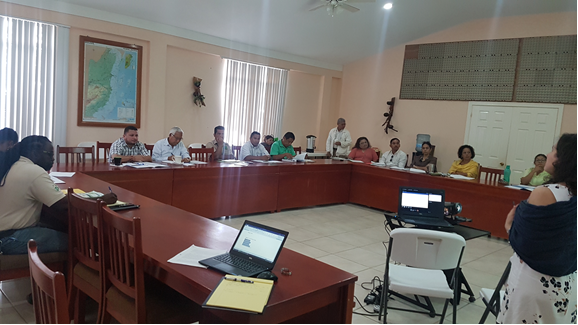The Institute organized a seminar to present its Bioeconomy and Productive Development Program, and to sensitize Belizean stakeholders on the importance of bioeconomy for rural development.

Belmopan, Belize, December 19, 2018 (IICA). There is an urgent need to improve Belize’s use of natural resources using a holistic integrated approach to national development – the production of raw materials, industrial policies and the fostering and regulation of consumption (e.g. fair trade, sustainability certification for greener or organic products) along the value chain.
This was the consensus during the seminar/workshop organized by the Inter-American Institute for Cooperation on Agriculture (IICA) in Belize to present the recently launched Bioeconomy and Productive Development Program, as well as to sensitize Belizean stakeholders on the importance of bioeconomy.
During the event, fifteen participants discussed the opportunities that exist for coherently addressing the complex challenges of generating new sustainable sources of economic and social growth through agricultural production, with the aim of contributing to the achievement of a majority of the Sustainable Development Goals adopted as part of the 2030 Agenda for Sustainable Development.
The seminar facilitated an engaged and interactive dialogue with about participants’ representative of the public & private sector and the academia and research main stakeholders’ organizations of IICA in Belize.
The projection of videos about practical examples triggered the interest around concrete practices of use of the bioeconomy; and the world-café session engaged participants in an in-depth discussion about the opportunities, challenges, best practices and experiences in relation to the topic.
An exercise of mapping the main present stakeholders showed that most have been already working on bioeconomy, despite not being called that way. This came to show the high potential to develop an agenda to continue working on the topic in taking advantage of existing complementarities such as: past & present collaborations among the main participating stakeholders, agriculture-based organizations, commitment to the sustainable development of the agricultural sector, as well as on education/extension, research & development, same/similar clients, target groups/entities.
There were also several opportunities that should be taken into account whilst continuing to work together, among which it is worth mentioning: greater results can be achieved with collaboration, greater efficiency, and more efficient promulgation of the message, among others.
Participants concluded that IICA should call-upon a follow up meeting early 2019 in order to agree on future steps in order to develop an agenda related to bioeconomy in Belize.
More information:
Willie Chan, Technical Coordinator in IICA Belize











